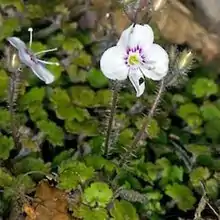Veronica jovellanoides
Veronica jovellanoides is a threatened flowering plant in the family Plantaginaceae. It is endemic to New Zealand and is only known to be found in a 20 ha forest west of Auckland.[2]
| Veronica jovellanoides | |
|---|---|
 | |
| Scientific classification | |
| Kingdom: | Plantae |
| Clade: | Tracheophytes |
| Clade: | Angiosperms |
| Clade: | Eudicots |
| Clade: | Asterids |
| Order: | Lamiales |
| Family: | Plantaginaceae |
| Genus: | Veronica |
| Species: | V. jovellanoides |
| Binomial name | |
| Veronica jovellanoides Garn.-Jones et de Lange | |
Description
Veronica jovellanoides is a creeping plant which grows into a mat 2–3 m across. It has 2 m long red-brown stems which are covered in many tiny hairs. Although it can cover a large area, it grows prostrate and only reaches a height of 5 cm.[2]
It has 4.5–12 mm spatula-shaped leaves which are green on top and a paler green below. The leaves also have reddish margins, suspended from 2–10 mm long very hairy pedicels. The leaves are hairy too and are toothed, with three to five pairs on each side.[2]
Flowering occurs from October to December and produces a white flower which has a four-lobed corolla (it has four petals), with a purple ring around the throat of the flower. The flower is 10–12 mm in diameter and the throat itself is a yellow-green.[2]
Fruiting is from December to February with a pale brown 1.2–1.8 by 1–1.4 mm seed. The capsules split open on wetting, revealing the flattened seed.[2]
Etymology
Veronica is after Saint Veronica, who presented Jesus her veil so that he could wipe his brow as he carried the cross through Jerusalem. The name itself is from the Macedonian name Berenice meaning: "Bearer of victory."[2]
Distribution and habitat
Veronica jovellanoides is endemic to New Zealand and occurs only in the North Island in Riverhead Forest northwest of Auckland. It it were not for the protection of the 20 ha forest by the Native Forest Restoration trust a few decades prior, then the plant would likely be extinct as it has not been found elsewhere.[2][3]
It can be found growing on shaded and damp ground among ferns, mosses and liverworts.[2]
Discovery
It was discovered in 2007 when a local plant nursery owner Geoff Davidson found it growing in the reserve on a walk with the field officer Sharon Graham. He mistook for a different plant at first but DNA testing and its distinctive flowers proved otherwise. As of 2009, only three specimens had been discovered. Dr de Lange, a New Zealand botanist, suggested the best way to save it would be to get people to plant it in their gardens. Plants are available from Geoff Davidson's Otaria nursery.[3]
References
- "NZTCS" | https://nztcs.org.nz/assessments/34546 | Retrieved 2021-01-30.
- "Veronica jovellanoides". New Zealand Plant Conservation Network. Retrieved 2021-01-27.
- "Rare plant in forest has botanists bamboozled". NZ Herald. Retrieved 2021-01-28.
